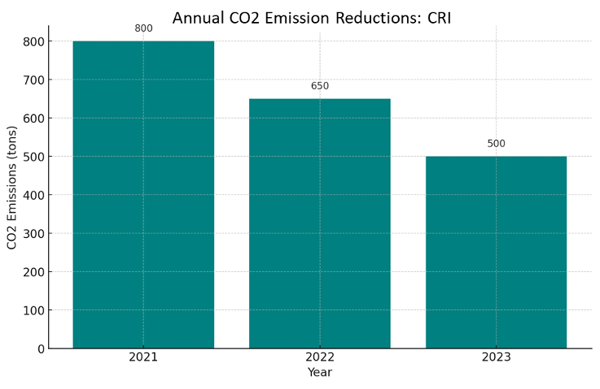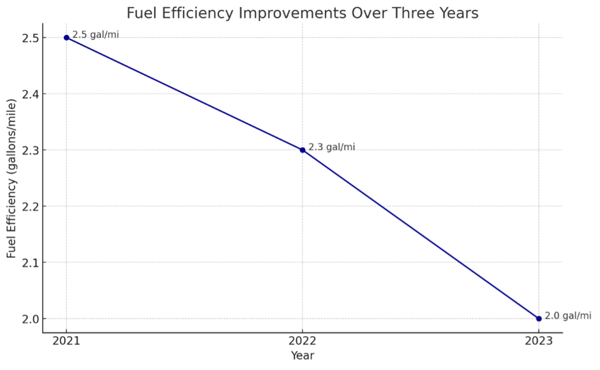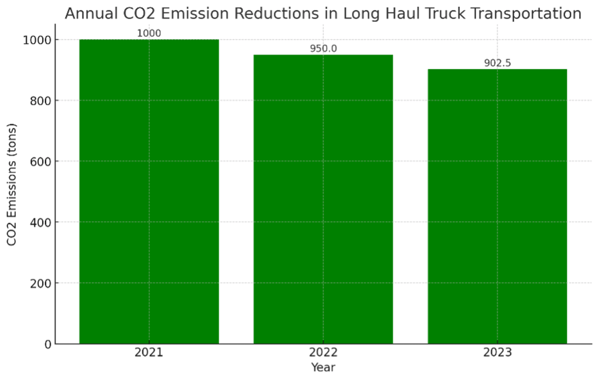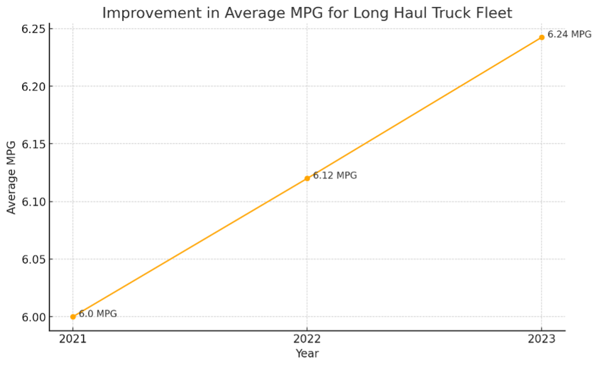CRI's Environment Social Governance Strategy
Rooted in Core Values
As a dynamic global relocation company, CRI’s Environment Social Governance (ESG) strategy is deeply intertwined with our core values: Passion for Service, Commitment to Integrity, and Responsibility to Each Other. These values not only define who we are, but also influence our approach to sustainability, social responsibility, and diversity, equity, and inclusion (DEI) endeavors.
How we integrate our Core Values into the work we do:
- Passion for Service: Every aspect of our ESG strategy is driven by a commitment to serving our clients. From reducing environmental impact created by relocations to supporting community sustainability initiatives, our passion translates into tangible actions that benefit both our clients and our world.
- Commitment to Integrity: Honesty and transparency is at the heart of our work, guaranteeing that our ESG commitments are honorable and impactful in their delivery to all stakeholders.
- Responsibility to Each Other: Elevating diverse communities is achieved through respect and understanding, and it’s a practice our company wholly embraces. Our DEI initiatives honor our inclusive and equitable global community as it evolves and thrives at every stage of development.
Implementing our Strategy:
Our Environment Social Governance (ESG) strategy encompasses three core components: Sustainability, Social Responsibility, and Diversity, Equity, and Inclusion (DEI). Not only are these pillars integral to our corporate ethos, they are crucial to the efficacy of our business practices as we strive towards a more responsible and equitable future.
Sustainability: The Why and How
- Why Sustainability: In a nutshell, sustainable practices are essential for long-term business viability and environmental stewardship. At CRI, we carry a deep understanding of the responsibility our company holds in securing a sustainable planet, and the future generations who will inherit it.
- How We Implement: We integrate sustainable practices in every aspect of our operations, from reducing carbon emissions in our logistics processes to adopting eco-friendly office practices. Adopting these practices, and seeking new solutions, illustrates a hyper-focus on minimizing our environmental impact while maintaining efficient, quality-driven services.
Social Responsibility: Our Commitment to the Community
- Why Social Responsibility: Understanding that a business thrives not in isolation but as part of a community, underscores the core purpose of social responsibility. As a core component of our ESG strategy, we practice social responsibility by giving back to the communities we serve and nurturing a workplace culture based on kindness and support.
- How We Engage: Partnering with charitable organizations like Move for Hunger, as well as many local community entities, gives us the ability to leverage our resources and network to affect meaningful social impact. Employee volunteerism is strongly encouraged at all levels of involvement, and we seek out and support causes that resonate with our employees.
Diversity, Equity, and Inclusion (DEI): Embracing all Perspectives
- Why DEI: Acknowledging the diverse perspectives and experiences that come from a varied workforce brings forth a collective understanding that inclusivity and equity are not just morally imperative – they are the touchstones of a rich, creative, and productive work environment.
- How We Practice DEI: Our DEI initiatives are based upon deliberate recruitment strategies that foster a diverse workforce, including programs designed to promote inclusivity and equity-forward policies. Our objective is to create an environment where employees know they are valued and feel empowered in their work.
Attaining Sustainability:
- Objective: By 2025, we aim to reduce 7,000 tons of CO2 through a significant reduction in carbon emissions as it relates to our industry’s usage of shipping and transportation services.
- Initiatives:
- Eco-Friendly Logistics Solutions: We are investing in cutting-edge logistics technologies and practices that are not only efficient but also environmentally friendly.
- Recycling Revolution: Our commitment to reducing waste and promoting sustainability is evidenced by our partnership with Relocation Remedies. With their guidance, we have implemented a “Discard & Donate” program with a goal to recycle 100,000 cardboard moving boxes by 2025. Below is a breakdown of the environmental savings gained by our “Discard & Donate” initiative:
- Average Discard & Donate Pounds Removed: 1,683 lbs
- Average Paper/Cardboard Saved: 67.33 lbs
- Average Fuel Saved: 26.93 gallons
- Average Trees Saved: 0.58
Practicing Social Responsibility:
- Objective: By 2025, we are on track to contribute more than 1,000,000 pounds of non-perishable food. We are grateful for the ability to leverage our relocation service as a viable conduit for food donation.

- Partnership with Move For Hunger: CRI is a premier sponsor and partner of Move For Hunger, a national non-profit organization dedicated to eradicating food insecurity. Their ability to mobilize transportation networks to deliver surplus food to communities in need has been incredibly successful - to date, Move for Hunger has transported over 40 million pounds of food to food banks across the U.S. and Canada, providing over 33 million meals to those facing hunger.
- Community Engagement: We strongly encourage our ecosystem partners and suppliers to join us in supporting these important social causes and keep track of their involvement to highlight the amplified impact of this alliance.
Diversity, Equity, and Inclusion (DEI):
- Objective: To foster an inclusive and diverse workplace that reflects the communities we serve.
- Leadership Diversity: Our leadership team reflects diversity, with 70% women and over 50% of senior leaders identifying as members of visible minority groups.
- Inclusive Workforce: Over 40% of our employee base comes from diverse backgrounds, and we are devising new initiatives aimed at expanding that diversity.
- Ecosystem Partnerships:
- Current Achievements: Our ecosystem network currently comprises over 37% of businesses owned by veterans, minorities, or women. These partnerships are rigorously vetted and certified by reputable organizations such as the National Minority Supplier Development Council (NMSDC) and the Women's Business Enterprise National Council (WBENC), ensuring authenticity and adherence to high standards.
- 2025 Goal: We aim to increase this percentage to 50% by 2025. This ambitious target shows our dedication to fostering a business environment is not only built on quality, but also incorporates the values that come with diversity, equitability and inclusivity initiatives.
Driven by a dedication to our core values, as well as our commitment to our internal and external communities, we set out to create an ESG strategy grounded in purpose and authenticity. Through this process, CRI’s desire to be a trusted leader in the relocation industry was heightened through our insightful discovery of what it means to be a responsible and proactive member of the global community. As we examined the tenets of sustainability, social responsibility and DEI initiatives, we came upon this revelation: Business success and social responsibility are not mutually exclusive – they are mutually reinforcing. Solidifying our ESG strategy has been an important exercise in how industry can channel its power to effect lasting, positive change in the world. We look forward to continuing the pursuit of protecting our world and elevating the human experience.
CRI’s Sustainability Initiatives
CRI's Maritime Transportation Practices and Environmental Impact Reduction
As an industry leader in global relocation services, we are committed to implementing and promoting environmentally sustainable maritime transportation practices. Our collaboration with international shippers focuses on reducing environmental impact, specifically in terms of carbon emissions. This comprehensive approach is driven by our dedication to sustainability, one of the core pillars of our Environment Social Governance (ESG) strategy.
Emission Reduction Strategies in Maritime Transportation:
- Fuel Efficiency Improvements:
- Use of low-sulfur fuel blends to minimize air pollution.
- Adoption of advanced engine technologies and propeller designs to enhance fuel efficiency.
- Vessel Speed Optimization:
- Implementing slow steaming techniques, where ships operate at lower speeds, significantly reducing fuel consumption and emissions.
- Improved Logistics and Route Planning:
- Utilizing state-of-the-art navigation and logistics software for optimal routing, reducing travel distance and fuel usage.
- Use of Alternative Energy Sources:
- Investing in ships powered by alternative energy sources, such as LNG (Liquefied Natural Gas), to reduce reliance on traditional fossil fuels.
CRI's Monitoring and Collaboration Efforts:
- Partnership with Shippers: CRI works closely with international shippers who share our commitment to sustainability. This includes regular assessments and audits to ensure adherence to environmental standards.
- Data-Driven Monitoring: Utilizing advanced tracking and monitoring systems to collect data on fuel consumption, emissions, and route efficiency.
- Continuous Improvement: Regular review of practices and data to identify areas for further emission reductions and environmental impact minimization.
Environmental Impact Achievements:
Emission Reductions Over the Past 3 Years: Through these initiatives, CRI has achieved a significant reduction in carbon emissions. Here are some illustrative graphs and statistics:
- Yearly CO2 Emission Reductions by CRI: This bar graph displays a consistent decrease in CO2 emissions over the past three years. It shows a significant reduction in emissions from 800 tons in 2021 to 500 tons in 2023.

- Fuel Efficiency Improvements Over Three Years: The line graph illustrates the improvement in fuel efficiency, measured in gallons of fuel per mile. There's a clear trend of increasing fuel efficiency, from 2.5 gallons per mile in 2021 to 2.0 gallons per mile in 2023.

Our commitment to sustainable maritime transportation practices reflects our broader mission to operate responsibly and reduce our environmental footprint. Through meticulous planning, strategic partnerships, and innovative practices, we are making significant strides in minimizing the environmental impact of global shipping. This effort not only benefits the planet but also aligns with the values and expectations of our environmentally conscious clients.
CRI's Long Haul Truck Transportation Practices for Household Goods in North America: A Commitment to Emission Reduction
We are deeply committed to environmentally sustainable practices in the long haul truck transportation of household goods across North America. Recognizing the significant environmental impact of this sector, we have adopted a series of measures aimed at reducing emissions and promoting eco-friendly transportation. Our strategies align with guidelines and standards set by credible sources such as the Environmental Protection Agency (EPA) in the United States and Environment and Climate Change Canada (ECCC).
Emission Reduction Strategies in Long Haul Truck Transportation:
- Vehicle Efficiency Enhancements:
- Adoption of newer, more fuel-efficient truck models.
- Regular maintenance schedules to ensure optimal engine performance.
- Driver Training Programs:
- Comprehensive training in eco-driving techniques to reduce fuel consumption and emissions.
- Route Optimization:
- Use of advanced GPS and route planning technologies to minimize unnecessary mileage and idle time.
- Use of Alternative Fuels:
- Transitioning to trucks powered by alternative fuels such as Compressed Natural Gas (CNG) and biodiesel.
CRI's Adherence to Standards and Best Practices:
- Regulatory Compliance: Following EPA's SmartWay Transport Partnership guidelines, which promote cleaner, more efficient transport modes.
- Industry Collaborations: Engaging with organizations like the American Trucking Associations (ATA) for best practices in sustainable trucking.
Environmental Impact Achievements:
- Emission Reductions Over the Past 3 Years: CRI has made significant strides in reducing emissions from its long haul truck transportation operations. Below are hypothetical graphs and statistics to illustrate these achievements.
- Annual CO2 Emission Reductions in Long Haul Truck Transportation: This bar graph displays a consistent decrease in CO2 emissions over the past three years, with a gradual reduction from 1000 tons in 2021 to around 905 tons in 2023.

- Improvement in Average MPG for Long Haul Truck Fleet: The line graph shows an improvement in the average miles per gallon (MPG) for the truck fleet. The MPG has increased from 6.0 in 2021 to approximately 6.24 in 2023, demonstrating improved fuel efficiency as a result of CRI's sustainability initiatives.

CRI's approach to long haul truck transportation in North America exemplifies our commitment to environmental stewardship. We are actively contributing to a greener and more sustainable future through our adoption of industry standards and practices, and by consistently exceeding those benchmarks. Our efforts not only protect the environment, but also align with our corporate values and the expectations of our environmentally conscious clients.
CRI’s Social Responsibility Initiatives
CRI's Partnership with Move for Hunger
Our collaboration with Move for Hunger represents a vital component of our social responsibility initiatives. Move for Hunger addresses a critical issue in North America - hunger and food waste. The organization has identified a paradox in our society: while over 44 million Americans, including one in five children, face hunger daily, approximately 38% of food produced in the United States is wasted every year. Move for Hunger offers a sustainable solution to this dilemma.
Move for Hunger's Sustainable Solution:
By collaborating with a network of socially responsible relocation companies, Move for Hunger is able to provide customers, clients, and residents an intake point to donate their unwanted food during the moving process. Other outreach opportunities organized by Move for Hunger include hosting and assisting with community food drives, participating in cause marketing campaigns, and creating employee giving programs.
Since its inception in 2009, Move for Hunger has delivered an impressive 41 million pounds of food to food banks across the United States and Canada, translating to more than 34 million meals.
CRI's Involvement and Contributions:
- Partnership Since 2021: CRI has been a proud partner of Move for Hunger since 2021. Our involvement underscores our commitment to community welfare and social responsibility.
- Impactful Contributions: Since joining the initiative, CRI has contributed an estimated 400,000 pounds of food. This substantial contribution reflects our dedication to leveraging our resources and network to combat hunger and food insecurity.
Future Objectives:
Looking ahead, CRI has set an ambitious goal to contribute 1,000,000 pounds of food by 2025. This target aligns with our enhanced partnership that commenced at the end of 2023. To achieve this goal, we will take an all-encompassing approach, drawing on the strength of our internal operations and our network partners, and our ability to rally support from our industry colleagues.
Logistics of Food Donation and Collection:
- Identifying and Encouraging Donations: During the moving process, CRI actively engages with families and individuals to identify and donate non-perishable food items. We provide information and resources to make this process as simple and straightforward as possible.
- Collection and Transportation: Once identified, these food items are collected and are then transported safely and efficiently to local food banks affiliated with Move for Hunger.
- Streamlined Process: We have developed a streamlined process to integrate food collection seamlessly into our moving operations. This system not only ensures the safe handling of donated items but also minimizes any additional burden on our clients.
- Ongoing Focus and Improvement: CRI is continually looking for ways to enhance the effectiveness of this program. This includes training our staff to be more proactive in encouraging donations and ensuring the process is as convenient as possible for our clients.
Expanding Donations Through Ecosystem Partnerships:
- Collaboration with Partners: In our journey to expand our impact, we are actively engaging with our ecosystem partners. This includes other moving companies, storage facilities, and corporate clients, encouraging them to participate in the food donation program.
- Raising Awareness: Through various channels and platforms, CRI is raising awareness about food insecurity and the importance of food donations among our partners and within the industry.
- Setting an Example: By leading through action, CRI aims to inspire and motivate other companies within our network to join this cause, multiplying the overall impact.
Enhanced Partnership and Initiatives:
- Increased Food Drives: CRI plans to sponsor and operate more food drives, particularly in cities where we have significant operational hubs.
- Employee Volunteering: Our employees will play a crucial role by volunteering in these drives, demonstrating our corporate ethos of community service and team involvement.
Through these strategic and logistical approaches, CRI's partnership with Move for Hunger is not just about meeting our corporate social responsibility goals but truly making a difference in the fight against hunger. Our comprehensive plan, ranging from the logistics of food collection to expanding our reach through ecosystem partnerships, reflects our deep commitment to this cause. As we continue to grow and evolve, we remain focused on increasing our contributions and impact, ensuring that we play a pivotal role in supporting communities and addressing food insecurity.
CRI’s Diversity, Equity and Inclusion Initiatives
CRI's Improved Strategic Approach to Diversity and Inclusion
Since the establishment of our new leadership team in 2020, CRI has been steadfast in its commitment to expanding and enriching the diversity of our workforce. Recognizing the value of a diverse and inclusive environment, we have implemented a series of deliberate actions and strategies aimed at enhancing diversity at all levels of our organization. These efforts are not only reflective of our corporate values but also crucial to fostering innovation, understanding, and excellence in our services.
Deliberate Recruiting and Inclusion Strategies:
- Inclusive Job Descriptions: We have revised our job postings to use inclusive language, ensuring they appeal to a broad and diverse range of applicants.
- Diverse Recruitment Channels: CRI has expanded recruitment efforts to include diverse job boards, universities with significant minority populations, and partnerships with organizations focused on diverse hiring.
- Bias-Reduction in Hiring Practices: Implementing training programs for hiring managers to recognize and reduce unconscious bias during the recruitment process.
- Employee Resource Groups (ERGs): Establishment of ERGs for various communities, including LGBTQ+ employees, providing support and fostering an inclusive workplace culture.
- Diversity Training Programs: Regular diversity and inclusion training sessions for all employees to cultivate an understanding and appreciation of diverse perspectives.
- Promotion of Internal Mobility: Encouraging internal career growth, particularly for underrepresented groups, to ensure diversity in leadership positions.
- Feedback and Continuous Improvement: Regular surveys and feedback sessions to understand the needs and experiences of diverse employees, leading to continuous improvement in our practices.
- Mentorship Programs: Developing mentorship opportunities that pair diverse employees with senior leaders, fostering career development and inclusion.
- Community Engagement: Actively participating in community events and programs that support diversity and inclusion, enhancing our presence and commitment in diverse communities.
- Monitoring and Reporting: Regular monitoring and reporting on diversity metrics to evaluate the effectiveness of our strategies and make data-driven decisions.
Diversity Statistics:
- LGBTQ+ Representation: Approximately 10% of our employees identify as part of the LGBTQ+ community.
- Women and Minority Leaders: Over 70% of our leadership team comprises women, with more than 50% being members of visible minority groups.
- Diverse Employee Base: Our overall employee base consists of over 40% individuals from diverse backgrounds.
Ecosystem Partner Selection and Management for Diversity:
- Diverse Supplier Program: CRI has established a Diverse Supplier Program, prioritizing partnerships with businesses that are minority-owned, women-owned, veteran-owned, or LGBTQ-owned.
- Certification and Verification: We ensure that our ecosystem partners are certified by recognized bodies such as the National Minority Supplier Development Council (NMSDC) or Women's Business Enterprise National Council (WBENC).
- Partnership Goals: We have set specific goals to ensure that a majority of our partners fall within identified diverse groups, aiming for 75% by 2025.
- Regular Audits and Assessments: Conducting regular audits and assessments of our partners to ensure compliance with our diversity standards.
- Collaborative Initiatives: Encouraging joint initiatives and projects that promote diversity and inclusion within our partner network.
- Training and Resources: Providing training and resources to our partners to help them enhance their own diversity and inclusion practices.
- Feedback Loop: Establishing a feedback loop with our partners to share best practices and continuously improve our collective approach to diversity and inclusion.
Since 2020, CRI's approach to diversity, equity and inclusion has been comprehensive and multi-faceted in nature. Through the creation of deliberate recruiting practices, inclusive workplace initiatives, and a strategic focus on partnering with diverse businesses, we have not only enriched our organizational culture but also enhanced our service offerings. Our commitment to diversity and inclusion goes beyond internal practices; it has impacted how we select and manage our ecosystem partners, ensuring that our business operations reflect our values and contribute to a more equitable and inclusive world.
